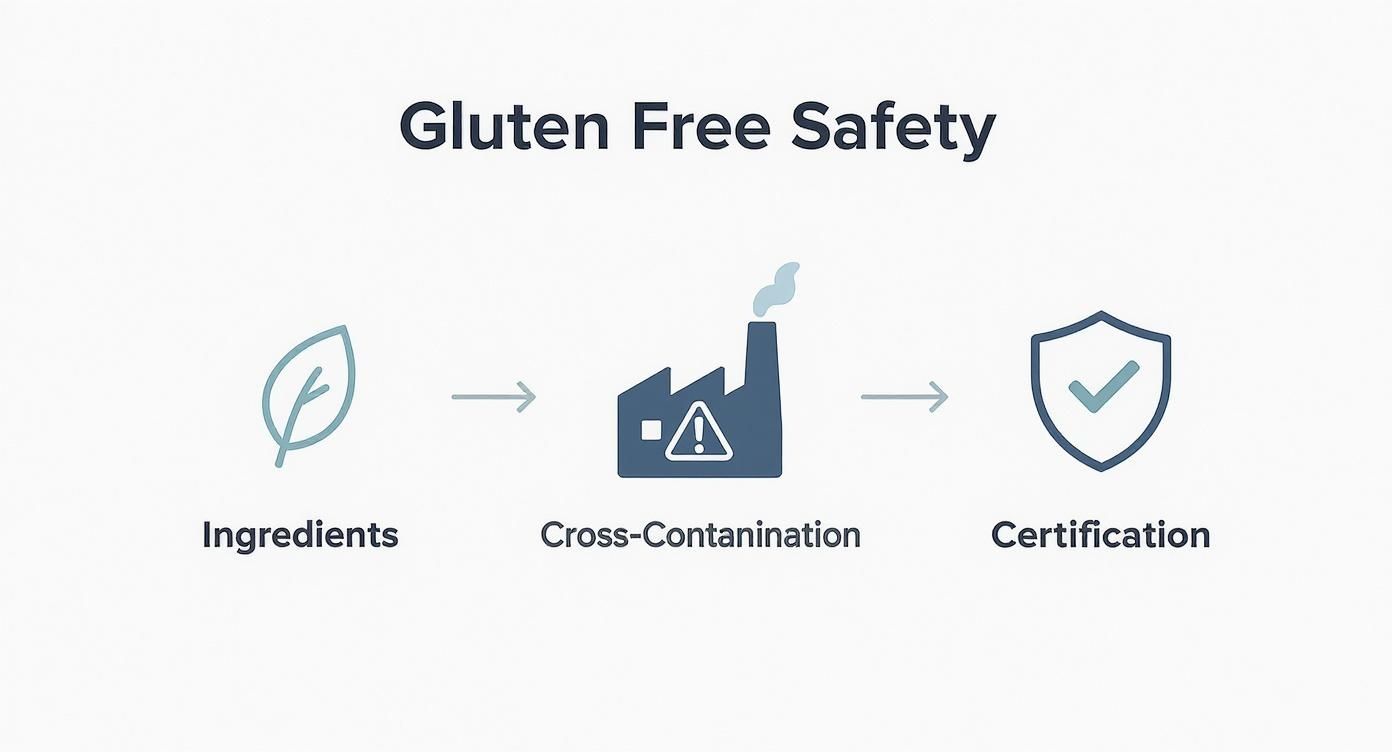Your Guide to Finding the Best Gluten Free Supplement
Ever feel like you’re doing everything right-meticulously avoiding gluten-but still end up bloated, tired, or just plain off by the end of the day? You’re not alone. It’s a frustratingly common story, and honestly, it can feel like you're walking a tightrope with your own body.
That unwelcome gas and discomfort-dun, dun, dun-is more than just an annoyance. These are often signs of an unhealthy gut crying out for a little extra support. Even with the best intentions, hidden gluten can sneak into sauces, seasonings, and restaurant meals, triggering an inflammatory response that leaves you feeling defeated.
This guide will show you how the right gluten free supplement can be a core part of your solution, helping you feel your best, fill nutritional gaps, and finally get some peace of mind.

Why a Gluten Free Supplement Is More Than Just a Pill
Let's reframe how we think about this. A gluten free supplement isn't just another pill to swallow; it’s a powerful tool in your wellness toolkit. Think of it as your daily support system-a way to give your body a consistent, reliable boost.
Here’s how it works:
- It’s a nutritional safety net. When you cut out wheat, barley, and rye, you can also unintentionally lose the vitamins and minerals those grains are often fortified with. A targeted supplement helps replenish these key nutrients, filling in the blanks left behind so you don’t have to worry.
- It’s a buffer against cross-contamination. Certain supplements, especially those with digestive enzymes, can provide backup against accidental gluten exposure. Now, let’s be super clear: they are NOT a license to eat gluten. But for those "oops" moments-like a shared fryer or a contaminated cutting board-they can help your body break down trace amounts, potentially easing the severity of symptoms like bloating and stomach pain.
This is all about taking back control and giving your body the consistent support it deserves. We’re in this together.
Common Nutrient Gaps on a Gluten-Free Diet
Going gluten-free is a fantastic move for many of us, but it can leave a few nutritional holes in your diet. Here’s a quick look at what you might be missing and why a targeted supplement is such a smart move.
| Nutrient | Why It's Often Low | How a Supplement Helps |
|---|---|---|
| B Vitamins | Enriched wheat flour is a major source of folate, thiamin, and niacin. | Replenishes these essential vitamins crucial for energy and metabolism. |
| Iron | Fortified cereals and breads are significant iron sources for many people. | Provides a concentrated dose to support red blood cell production and fight fatigue. |
| Fiber | Whole wheat is packed with fiber; many gluten-free alternatives are not. | Supports digestive regularity and promotes a healthy gut microbiome. |
| Calcium | While not in grains, gut inflammation from gluten can hinder calcium absorption. | Ensures you're getting enough for bone health, independent of absorption issues. |
Ultimately, filling these gaps isn't just about avoiding deficiency; it's about giving your body the fuel it needs to function at its absolute best.
Understanding Different Types of Gluten Free Supplements
Let's clear up a common point of confusion: "gluten free supplement" isn't a single, one-size-fits-all product. Think of it more like a specialized team of helpers, where each player has a very specific job to support your digestive health and overall well-being.
We're not talking about a magic pill that lets you eat a whole pizza (if only!). Instead, this is about building a smart, proactive strategy to help your body thrive.
Digestive Enzymes: Your Gut's Backup Defense
First up are digestive enzymes. Imagine these as your gut's personal cleanup crew. When you accidentally get a small amount of gluten-say, from that restaurant meal you were nervous about-these enzymes get to work.
Specialized enzymes, particularly one called DPP-IV, are specifically designed to help break down the tough gluten protein. This can be a total game-changer for minimizing the bloating and discomfort that follows accidental exposure. They act as your safety net for those "oops" moments.
A great way to use them? Take a digestive enzyme supplement before a meal where you're unsure about cross-contamination. It’s a proactive step that can offer incredible peace of mind.
Targeted Vitamins: Filling the Gaps
Next on the team are targeted multivitamins and minerals. When you remove fortified wheat products from your diet, it's easy to create nutritional gaps without even realizing it. Many conventional breads and cereals are enriched with essential nutrients.
A high-quality gluten free supplement focuses on replenishing what you might be missing, such as:
- B Vitamins: Crucial for energy production. Many gluten-free diets can be low in folate and B12.
- Iron: Necessary for fighting fatigue, it's often found in fortified grains.
- Vitamin D & Calcium: Gluten-related gut inflammation can sometimes interfere with the absorption of these nutrients, which are vital for bone health.
Choosing a supplement specifically formulated for these needs ensures your body gets the fuel it requires, helping you feel energized and strong. To put different supplement types into perspective, you might find a comprehensive guide to supplements for hair growth helpful for seeing how different ingredients target specific wellness goals.
Probiotics: The Gut Guardians
Finally, we have probiotics, the friendly bacteria that act as guardians for your gut microbiome. Gluten can disrupt the delicate balance of your gut flora, sometimes leading to persistent digestive issues even after you've cut it out. Yikes!
Probiotics work to restore harmony by repopulating your gut with beneficial bacteria. This not only aids digestion but also supports your immune system and can even influence your mood.
A balanced microbiome is the foundation of a happy, resilient gut, making probiotics a key player in any long-term gluten-free wellness plan.
Why Certified Gluten-Free Is Non-Negotiable
Here’s a critical detail that many people overlook when buying a gluten free supplement: a product made with naturally gluten-free ingredients isn't automatically safe. It's a subtle but hugely important distinction that can make all the difference in how you feel.
The real risk often isn't the core ingredients, but the hidden danger of cross-contamination during manufacturing.
The Busy Kitchen Analogy
Imagine a bustling restaurant kitchen. One chef is preparing a gluten-free dish, but the station right next to them is being used to toss flour for pizza dough. Even with the best intentions, without strict separation and cleaning, airborne flour particles can easily settle into the "safe" food.
The same thing can happen in a supplement facility. If a company uses the same equipment for both gluten-containing and gluten-free products without a thorough, validated cleaning process, trace amounts of gluten can end up in your supplement. For someone with celiac disease or a serious sensitivity, even a tiny bit is enough to cause bloating, brain fog, and all-around misery.
The Power of Certification
This is exactly why a "Certified Gluten-Free" seal is an absolute must-have. It’s not just a fancy sticker on the bottle; it’s a verified promise of safety and accountability.
Our founder, Sam, learned this lesson the hard way. He was taking a supplement that claimed to be gluten-free but wasn't certified. After weeks of dealing with frustrating digestive issues, he finally pinpointed the supplement as the culprit. That experience became a cornerstone of the Yuve philosophy: every single product must be certified to protect our community.
When you see that certification seal from a reputable third-party organization, it's your proof that the product has been through serious testing. The Gluten-Free Certification Organization (GFCO), for example, demands that products contain less than 10 parts per million (ppm) of gluten-a standard twice as strict as the FDA's 20 ppm guideline.
Looking for these official seals turns a guessing game into an empowered choice. It’s the only way to be 100% sure that what you're putting in your body is genuinely safe. This principle is a key part of finding the best third-party tested supplements, as it guarantees purity goes beyond just one ingredient. We proudly meet these tough standards at Yuve, so you can focus on your health without a shadow of a doubt.
Decoding Supplement Labels Like a Pro
Now that you know how crucial certification is, let's get into the nitty-gritty: the ingredient list. Think of a supplement label as its autobiography-it tells you the whole story about what you’re putting into your body. A top-tier gluten free supplement is defined as much by what it contains as by what it thoughtfully leaves out.
Feeling a bit lost staring at a long list of scientific-sounding names? Don't sweat it. We've got your back. It’s actually pretty straightforward once you know which ingredients are your gut’s best friends and which are just troublemakers in disguise.
This visual gives you a great overview of what to look for, from pure ingredients all the way to that final certification seal.

As you can see, making sure a supplement is safe isn’t just one step. It's a comprehensive process, from sourcing the raw materials to sealing the final bottle.
Supplement Ingredients: The Heroes vs The Villains
Here's a quick cheat sheet to help you identify the best and worst ingredients in your supplements. Think of it as your field guide to label reading.
| The Heroes (Look For These) | The Villains (Watch Out For These) |
|---|---|
| Specific Digestive Enzymes (e.g., DPP-IV) | Artificial Fillers (e.g., Magnesium Stearate) |
| Essential Vitamins (e.g., B12, Folate) | Synthetic Colors & Flavors (e.g., Red 40 Lake) |
| Gut-Calming Herbs (e.g., Ginger, Turmeric) | Hidden Allergens (e.g., "natural flavors") |
Knowing the difference between these ingredients is your best defense against a subpar product.
The Heroes: What to Look For on the Label
When you scan a label, certain ingredients should immediately give you a good feeling. These are the "heroes" that actively support your digestive system and overall well-being.
- Specific Digestive Enzymes (like DPP-IV): This one is a total superstar for anyone avoiding gluten. DPP-IV is specifically known for its ability to help break down the tough proline-rich peptides in gluten, which offers a fantastic safety net for accidental cross-contamination.
- Essential Vitamins (B12 & Folate): As we talked about earlier, a gluten-free diet can sometimes leave you short on key B vitamins. Seeing these in a supplement, especially in their active forms like methylcobalamin for B12, shows the formula was intentionally designed to fill those nutritional gaps.
- Gut-Calming Herbs: Ingredients like ginger, peppermint, or turmeric are packed with natural anti-inflammatory properties that can help soothe an irritated digestive tract. They provide gentle, plant-based support when you need it most.
At Yuve, we obsess over our formulas. We don’t just slap a "gluten-free" label on our products; we build them from the ground up with clean, vegan, and genuinely effective ingredients. We firmly believe what’s not in your supplement is just as important as what is.
The Villains: What to Avoid at All Costs
Just as important as knowing the good stuff is knowing what to steer clear of. These "villains" are often cheap fillers or totally unnecessary additives that can cause a whole new set of digestive problems. No, thank you!
- Artificial Fillers (like Magnesium Stearate): These are often used simply to make the manufacturing process cheaper and easier. They bring zero health benefits to the table and can sometimes even interfere with how well your body absorbs the actual nutrients.
- Synthetic Colors & Flavors: Why on earth would you need "Red 40 Lake" or other artificial chemicals in a health product? Your body doesn’t need them, and for sensitive people, they can be a source of irritation.
- Hidden Allergens: Be wary of vague terms like "natural flavors" or starches from unspecified sources. These can sometimes be hiding places for gluten or other common allergens you’re trying to avoid.
By learning to spot these heroes and villains, you stop being a hopeful buyer and become a confident, label-reading expert. You absolutely deserve a supplement that is pure, effective, and completely free from anything that doesn’t serve your health.
How Probiotics Support a Gluten-Free Lifestyle
Think of your gut as a delicate ecosystem, home to trillions of tiny microorganisms. When this system-your microbiome-is in balance, your digestion hums along nicely. But if you’re sensitive to gluten, even accidental exposure can throw everything into chaos, leading to that dreaded bloating, gas, and discomfort.
This is where probiotics can be a game-changer. These beneficial bacteria are like the reinforcements you call in to restore peace and order to your gut.

Restoring Balance and Soothing Your System
When your gut microbiome gets thrown off balance, it can trigger inflammation and increase intestinal permeability-a condition often called "leaky gut." This not only makes you more sensitive to other foods but can also drag out your recovery time after being "glutened."
A high-quality gluten free supplement with probiotics helps repopulate your gut with the good guys. These helpful strains get to work by:
- Strengthening the gut barrier: They help patch up and reinforce your intestinal lining, making it less permeable and more resilient.
- Crowding out harmful bacteria: Good bacteria compete for space and resources, leaving less room for the troublemakers to flourish.
- Supporting your immune system: A huge part of your immune system is actually in your gut, and a balanced microbiome is essential for it to function correctly.
For those truly committed to the gluten-free life, having the right tools in the kitchen can make all the difference. Investing in dedicated appliances is a smart move. For example, a great resource for the best gluten-free breadmaker can help you bake safely and easily at home.
The Rise of Gluten-Free Probiotics
It’s clear why so many people are seeking out this kind of gut support. The market for gluten-free probiotics was valued at $2.2 billion and is projected to climb to $3.7 billion by 2034. This growth is all thanks to a better understanding of just how vital a balanced gut is for overall health.
Science Corner: What Does CFU Even Mean?
You’ve probably seen "CFU" on probiotic labels. It stands for Colony Forming Units, and it’s a measure of the number of live, active bacteria in a single dose. While a high CFU count is often a good sign, the diversity of the bacterial strains is just as crucial. A 2021 study in the journal Nutrients highlighted that a multi-strain probiotic can be more effective for gut balance than a single-strain one. What this means for you is that looking for a blend of different probiotic types offers more complete support for your gut.
At Yuve, we designed our vegan, certified gluten free probiotic with this in mind. It contains a diverse blend of beneficial strains to give your gut well-rounded support. We also include prebiotics-the food that helps these good bacteria thrive-making it a core solution for a happier gut. Adding a quality probiotic to your daily routine isn't just about managing symptoms. It’s about proactively building a stronger, more resilient gut. To learn more, check out our guide on natural probiotics and prebiotics.
Your Simple Plan for Choosing the Right Supplement
Feeling empowered? Good! Now let's put all that knowledge into practice. Choosing the right gluten free supplement shouldn't feel like a high-stakes test. With a solid plan, you can confidently pick the perfect support system for your body and finally get that peace of mind you deserve.
Think of this as your simple, go-to checklist for making a smart choice.
Step 1: Define Your Primary Goal
First things first, ask yourself one simple question: "What is my number one reason for needing a supplement?" Pinpointing your main goal will immediately narrow down your search and point you toward the right type of product.
- For nutritional support: Worried about filling the gaps that a gluten-free diet can sometimes create, like missing B vitamins or iron? A well-formulated multivitamin is your best bet.
- For cross-contamination concerns: Is your biggest worry about accidental gluten exposure when eating out? A digestive enzyme formula containing DPP-IV is the hero you need for that safety net.
- For overall gut health: If you're still dealing with frustrating bloating and general digestive upset, a high-quality probiotic like Yuve's Vegan Probiotic can work wonders to help restore balance to your gut microbiome.
Step 2: Stick to the Golden Rules
Once you know what you’re looking for, it's time to apply the non-negotiables we've already covered. This is how you filter out the junk and focus only on options that are truly worth your time and money.
- Demand Third-Party Certification: My motto is simple: no seal, no deal. Always look for a verified "Certified Gluten-Free" label from an independent organization to guarantee its safety.
- Scan for Heroes, Not Villains: Give the ingredient list a quick read. You want to see clean, active ingredients you recognize. Steer clear of products loaded with artificial fillers, synthetic colors, and vague terms like "natural flavors."
We actually designed Yuve supplements to be that trustworthy starting point that ticks every single one of these boxes. Our formulas are certified gluten-free, vegan, and made without any of that junk. It’s the simple, effective support we believe everyone deserves.
Your Top Questions About Gluten Free Supplements Answered
Let's tackle some of ahe most common questions we hear. Getting clear, straightforward answers is the best way to feel confident as you work toward better gut health.
Can a Supplement Let Me Eat Gluten?
This is the big one, and the honest answer is a firm "no." I do NOT think any supplement should be used this way. Think of a gluten-free supplement with digestive enzymes as a safety net, not a free pass to eat whatever you want. It's there to help your system handle accidental cross-contamination-those tricky situations when you're eating out or at a friend's house.
It is absolutely not a cure for celiac disease or a license to start eating pizza and pasta again. For anyone with celiac disease or a serious intolerance, sticking to a strict gluten-free diet is non-negotiable for your health and well-being.
How Long Does It Take to Feel a Difference?
That really depends on what kind of supplement you're taking!
- Digestive Enzymes: These guys are fast-acting. You take them just before a meal, and they get to work right away, helping your body break down food more efficiently.
- Vitamins & Probiotics: These are more about playing the long game. It can often take a few weeks of consistent, daily use to really replenish your nutrient stores or see a positive shift in your gut microbiome.
Are All Vitamins Actually Gluten-Free?
You'd think they would be, but surprisingly, many are not. It's a frustrating reality for anyone who has to be careful. Many common supplements use fillers, binders, or coatings that contain wheat starch or other gluten-derived ingredients.
This is exactly why simply scanning the ingredient list isn't always enough. Your best bet is to look for a third-party "Certified Gluten-Free" seal on the bottle. That certification is your only real guarantee that the product has been tested and is truly safe.
If I Can Only Pick One Supplement, Which Should It Be?
This is a great question, and it all boils down to your specific needs. Take a second to think about what your biggest challenge is right now.
If your primary worry is navigating accidental gluten exposure when you're not in control of the kitchen, then a solid digestive enzyme formula is your best friend. But if you're dealing with more persistent issues like bloating and want to build a healthier, more resilient gut over time, a high-quality probiotic like Yuve's is an excellent starting point. And if your main goal is boosting your overall energy and wellness, a targeted multivitamin can help fill in those common nutritional gaps.
At Yuve, we make it simple. All our supplements are vegan and Certified Gluten-Free, so you never have to second-guess what you're putting in your body. Ready to give your gut the support it deserves? Explore our clean, effective formulas today.
